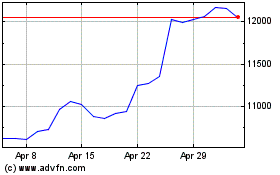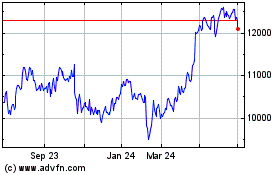J&J Covid-19 Vaccine Pause Spotlights Science of Rare Clotting Disorder
April 13 2021 - 6:04PM
Dow Jones News
By Daniela Hernandez and Brianna Abbott
Scientists are racing to gain a better understanding of a rare
blood clotting disorder that affected six recipients of Johnson
& Johnson's Covid-19 vaccine and led health authorities Tuesday
to recommend a pause in its use.
"It is quite a rare disease, and an unusual manifestation of
abnormal blood clotting in the body, but it is very serious,"
Thomas Oxley, an interventional neurologist and stroke expert at
Mount Sinai Health System in New York City, said of the clotting
disorder.
The six people in the U.S. known to have been affected by the
disorder following vaccination are among almost 7 million Americans
to have received the vaccine.
They were diagnosed with cerebral venous sinus thrombosis, or
CVST, a condition that involves the formation of clots within large
blood vessels in the brain. That was accompanied by a drop in
platelets, blood components that aid in the formation of clots.
The clots can increase pressure within the skull, leading to
hemorrhaging and stroke, Dr. Oxley said.
The six patients, all women between the ages of 18 and 48 years,
developed symptoms six to 13 days following vaccination.
People who develop severe headache, abdominal or leg pain or
shortness of breath within three weeks after vaccination should
immediately contact their healthcare providers, according to
federal officials. The risk of clotting among people who got the
J&J shot more than a month ago is very low, said Anne Schuchat,
the principal deputy director at the Centers for Disease Control
and Prevention.
Doctors aren't certain what causes the clots to form. One
hypothesis is that the vaccine causes the body to mount an immune
reaction that activates platelets to form clots, according to Jean
Connors, a hematologist at Brigham and Women's Hospital. This can
go unchecked, which is why the vaccine-associated immune disorder
appears to have a higher mortality rate than traditional CVST,
which is caused typically by single clotting events rather than a
runaway clotting disorder, she said.
In two studies published in April in the New England Journal of
Medicine, German and Norwegian researchers detailed this rare
immune response, which targets a protein on the surface of
platelets, following vaccination with AstraZeneca PLC's Covid-19
vaccine. Patients examined by the researchers developed a severe
clotting condition.
The AstraZeneca vaccine and Johnson & Johnson's both use
so-called viral vector technology, in which genetic instructions
for a key component of the novel coronavirus are placed within a
harmless virus and then injected into the body to trigger immunity
to the pathogen.
"The beauty is that you use natural systems, which are optimized
by millions of years of evolution, to deliver what you want to have
your body respond to," said Vincent Munster, chief of the virus
ecology section at the National Institute of Allergy and Infectious
Disease, which helped with development of the AstraZeneca
vaccine.
These vaccines offer several advantages over shots using older
technology. They seem to activate not just the antibodies that
neutralize a virus but also the memory and T-cells that keep the
immune defense alert for the long-term.
The vaccines developed by Moderna Inc. and by Pfizer Inc. with
BioNTech SE use a different technology, known as mRNA. Health
authorities haven't seen any cases of clotting with low platelet
counts associated with those vaccines, the CDC's Dr. Schuchat
said.
In the case of the J&J vaccine, clots may also be forming in
other parts of the body but only ones in the blood vessels in the
brain have been detected so far, in part because the vaccine has
had a limited rollout in the U.S.
In Europe, there has been a wider range of abnormal clots among
the 34 million people who received the AstraZeneca shot.
"We don't know if we had given a lot more doses of the J&J
vaccine if we would have seen other [types of] clots," said Gary
Raskob, a blood-clotting expert at the University of Oklahoma. "We
haven't heard of this with Pfizer and Moderna."
--Joseph Walker and Bojan Pancevski contributed to this
article.
Write to Daniela Hernandez at Daniela.Hernandez@wsj.com and
Brianna Abbott at brianna.abbott@wsj.com
(END) Dow Jones Newswires
April 13, 2021 17:49 ET (21:49 GMT)
Copyright (c) 2021 Dow Jones & Company, Inc.
Astrazeneca (LSE:AZN)
Historical Stock Chart
From Mar 2024 to Apr 2024

Astrazeneca (LSE:AZN)
Historical Stock Chart
From Apr 2023 to Apr 2024
